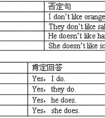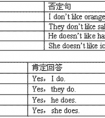用所给单词的适当形式填空。1.Can your aunt _____ (speak) English?2.Please_____ (call)me when your mother gets home. 3.He often _____(watch) TV on Sundays. 4-七年级英语
题文
| 用所给单词的适当形式填空。 |
| 1. Can your aunt _____ (speak) English? 2. Please_____ (call) me when your mother gets home. 3. He often _____ (watch) TV on Sundays. 4. How much _____ (be) the T-shirts? 5. Does your brother _____ (have)a tennis racket? 6. I like bananas and my sister _____ (like) bananas, too. 7. Jim usually _____ ( eat) his breakfast at seven. 8. Miss Miller is our math teacher. We all like_____ ( she). 9. Please come and see for _____ (you) at Hongda Clothes Store. 10. Our English speech is on June_____ (one). |
答案
| 1. speak 2. call 3. watches 4. are 5. have 6. likes 7. eats 8. her 9. yourself 10. first |
据专家权威分析,试题“用所给单词的适当形式填空。1.Can your aunt _____ (speak) Eng..”主要考查你对 实义动词,序数词,人称代词,反身代词,一般现在时 等考点的理解。关于这些考点的“档案”如下:
实义动词序数词人称代词反身代词一般现在时
考点名称:实义动词
- 实意动词:
即行为动词,表示动作的动词。实义动词与系动词是相对的,能独立用作谓语。
它分为及物动词和不及物动词两种:
及物动词是指后面要求有直接宾语的动词;
不及物动词指后面不需要跟宾语的动词。 实意动词使用方法:
及物动词
后面必须跟宾语意义才完整的实义动词,叫做及物动词(transitive verb)。如:
I believe that the committee will consider our suggestion.我相信委员会将会考虑我们的建议。
“How long can I keep the book ?”Harry asked.哈里问:“这本书我可以借多久?”
Dr. Bethune set us a good example. 白求恩大夫给我们树立了好榜样。
Crude oil contains many useful substances.原油含有许多有用的物质。
不及物动词
本身意义完整后面不须跟宾语的实义动词,叫做不及物动词(intransitive verb)。如:
Birds fly.鸟会飞。
It happened in June 1932.这件事发生于一九三二年六月。
My watch stopped.我的表停了。
She spoke at the meeting yesterday evening. 她在昨天晚上的会上发了言。
兼作及物动词和不及物动词
英语里有不少实义动词可以兼作及物动词和不及物动词。这样的动词又有两种不同的情况
a)兼作及物动词和不及物动词时,意义不变。试比较:
Shall I begin at once?我可以立刻开始吗?(begin作不及物动词)
She began working as a librarian after she left school.她毕业后当图书馆管理员。(began作及物动词)
When did they leave Chicago?他们是什么时候离开芝加哥的?(leave 作及物动词)
They left last week. 他们是上周离开的。(left 作不及物动词)
b)兼作及物动词和不及物动词时,有时意义不尽相同。如:
Wash your hands before meals.饭前要洗手。
Does this cloth wash well? 这布经得起洗吗?- 英汉实意动词用法比较:
与汉语的比较,有时英语动词的及物和不及物的用法,与汉语的用法不一样,请注意下列两种情况:
a)有的动词在英语里只能用作不及物动词,而汉语则可用作及物动词,如arrive到达,agree同意,listen听。英语里这些动词后面常接介词。如:
We arrived at the railway station at noon.
我们于中午到达火车站。(at不能省去)
(比较:We reached the railway station at noon.)
Everybody listened to the lecture with great interest.
每个人都很有兴趣地听讲课。(to不可省去)
(比较:We all heard the lecture.)
Do they agree to the plan?他们同意这个计划吗?(to不可省去)
b)有的动词在英语里能用作及物动词,而在汉语里则不能用作及物动词,如serve为…服务。
Our children are taught to serve the people wholeheartedly.
我们的儿童被教以全心全意为人民服务
用于be动词之后,实义动词之前。 实意动词的用法:
肯定句:
主语+动词过去式+其它
否定句:
主语+助动词didn‘t+动词原型+其他
一般过去式:
Did+主语+动词原型+其他
考点名称:序数词
- 序数词:
是数词的一种,主要在英语语法中讲到,在汉语中表示为“第几”。如:first, second, third, fourth 序数词的读法与写法:
序数词写法:
1 first ;2 second ; 3 third ;4 fourth ; 5 fifth ;
6 sixth ;7 seventh; 8 eighth;9 ninth ;10 tenth ;
11 eleventh ;12 twelfth ;13; thirteenth ;14 fourteenth;15 fifteenth
16 sixteenth ;17 seventeenth ;18 eighteenth;19 nineteenth;
20 twentieth ;30 thirtieth ;40 fortieth ;50 fiftieth ;60 sixtieth ;70 seventieth;80 eightieth ; 90 ninetieth多位序词:
由基数词的形式变结尾部分为序数词形式来表示。
one hundred and twenty-first 第一百二十一
one thousand three hundred and twentieth 第一千三百二十
two hundred and fifty-second 第二百五十二缩写:
有时,序数词可以用缩写形式来表示。主要缩写形式有:
first——1st ;second——2nd ;third——3rd; fourth——4th ;sixth——6th ;twentieth——20th;twenty-third——23rd
其中lst,2nd,3rd为特殊形式,其它的都是阿拉伯数字后加上th。序数词前不加the的情况:
在英语中,使用序数词时前面要加定冠词 the,但是,在下面的情况下则不加 the:
1.当序数词前有形容词性物主代词或名词所有格修饰时,序数词前不用 the。
Mother was my first teacher in my life.妈妈是我生命中的第一个老师。
Tom is Lily's third boyfriend. 汤姆是莉莉的第三个男朋友。
2.当表达分数时,序数词前不用 the。
One fifth of the students here are from the country. 这儿1/5的学生来自农村。
Three fourths of the students here are from the country. 这儿的3/4的学生来自农村。
3.当表达“又一,再一”时,序数词前不用 the,但可加不定冠词。
Please give me a second chance. 请再给我一次机会。
The poor woman had a third baby. 那个可怜的妇女又生了第三个宝宝。
4.当表达“年月日”时,尤其在朗读时,序数词前要加 the。
He was born on June 6th, 1974. 他出生在1974年6月6日。
5.当序数词在句中作状语时,序数词前不用 the。
Who got there second? 谁第二个到那儿的?
I finished the work first. 我最先完成那项工作。
6. 当表达考试(比赛等)中获得的名次时,序数词前不用 the。
She stands first in her class. 她在班上成绩排名第一。基数词变序数词的口诀:
基变序,有规律,词尾加上-th。
一,二,三,特殊记,词尾字母t,d,d。
八去t,九除e,ve要用f替,ty将y变成i,th前面有个e。
若是碰到几十几,前用基来后用序。
- 最新内容
- 相关内容
- 网友推荐
- 图文推荐
| [家长教育] 孩子为什么会和父母感情疏离? (2019-07-14) |
| [教师分享] 给远方姐姐的一封信 (2018-11-07) |
| [教师分享] 伸缩门 (2018-11-07) |
| [教师分享] 回家乡 (2018-11-07) |
| [教师分享] 是风味也是人间 (2018-11-07) |
| [教师分享] 一句格言的启示 (2018-11-07) |
| [教师分享] 无规矩不成方圆 (2018-11-07) |
| [教师分享] 第十届全国教育名家论坛有感(二) (2018-11-07) |
| [教师分享] 贪玩的小狗 (2018-11-07) |
| [教师分享] 未命名文章 (2018-11-07) |


![How much does it ______ to fly from Yancheng to Hainan Island?[ ]A. cost B. payC. spend D. take-七年级英语](http://www.00-edu.com/d/file/ks/4/2/shiyidongci/2020-01-05/small7dcf2f05998de63e10cc3629787031c81578210087.png)

![He always _____TV in the evening. He _____ listening to the radio. [ ]A. watch, don't like B. watches, doesn't like C. watching, don't like D. watch, do-七年级英语](http://www.00-edu.com/d/file/ks/4/2/shiyidongci/2020-01-05/small45d599b4a60b84e61cec210bfbf051f51578214524.png)
![I'd rather ___ to the Mcdonald's Restaurant because I like to listen to quiet music.[ ]A. to go B. going C. go D. went-八年级英语](http://www.00-edu.com/d/file/ks/4/2/shiyidongci/2020-01-05/small1767bba1727fef2c035c53dcbd9bc20e1578209517.png)
